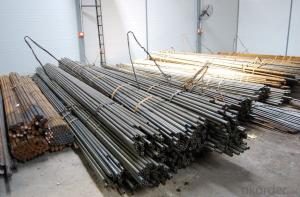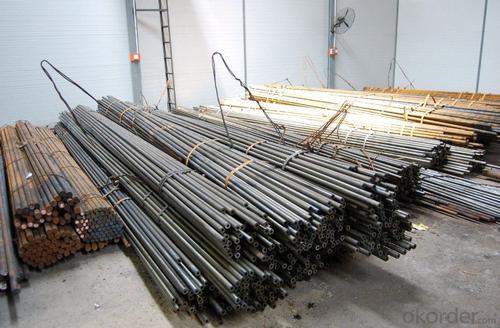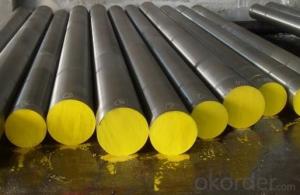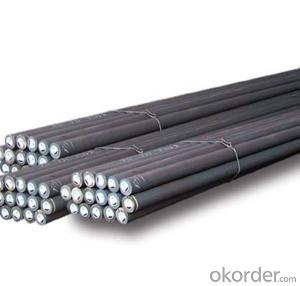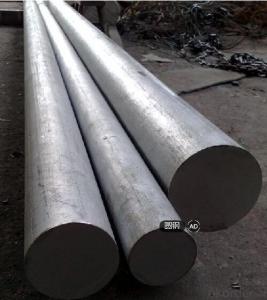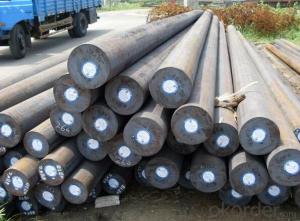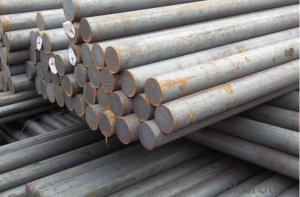Special Steel DIN 1.2365 Steel Round Bar
- Loading Port:
- China main port
- Payment Terms:
- TT OR LC
- Min Order Qty:
- 30 m.t.
- Supply Capability:
- 10000 m.t./month
OKorder Service Pledge
OKorder Financial Service
You Might Also Like
Specification
Specifications
1.2365 steel round bars
1.Diameter:10mm~600mm,
2.Delivery Conditon:annealed, black/turned surface
3.Short Delivery Time
Product information
| 1.2365 steel round bars | |||||||
| Chemical Composition(%) | |||||||
| C | Si | Mn | P | S | Cr | Mo | V |
| 0.28-0.35 | 0.10-0.40 | 0.15-0.45 | ≤0.030 | ≤0.030 | 2.70-3.20 | 2.60-3.00 | 0.40-0.70 |
| Specialty | |||||||
| 1.Excellent machinability, easy to be processed, shorten the time of making molds. | |||||||
| 2. No need to be hardened after processing, free from quenching deformation, cracks and telescopic | |||||||
| 3.High resistance of thermal cracking, good strength in high temperature, long-life of molds. | |||||||
| Use | |||||||
| 1.Light alloy pressure forming; steel forging forming the mold; extrusion die; heavy alloy production of iron as well as guide sleeve | |||||||
| 2. Pressure forming die mold; die casting mold (upper die and lower die inserts, thimble and sleeve cold punching, hot shear and wear parts. | |||||||
| 3. Extrusion die (die, the die pad, the extruder barrel, punch); aluminum, copper, magnesium and the hot forming die; plastic | |||||||
| Heat Treatment | |||||||
| 1. Quench:1030-1060°c by oil or wind cooling | |||||||
| 2. Tempering:600~700 °c | |||||||
| Melting Process | |||||||
| 1. EAF: Electric Furnace+LF+VD(Optional) | |||||||
| 2. ESR: Electric Furnace+LF+VD+Eleroslag Remelted(Optional) | |||||||
| UT Class | |||||||
| According to Standard of SEP 1921/84,100% Volume, Level C/c, D/d or E/e | |||||||
| Tolerance on Quantity | |||||||
| +/-10% Per Size | |||||||
Product show
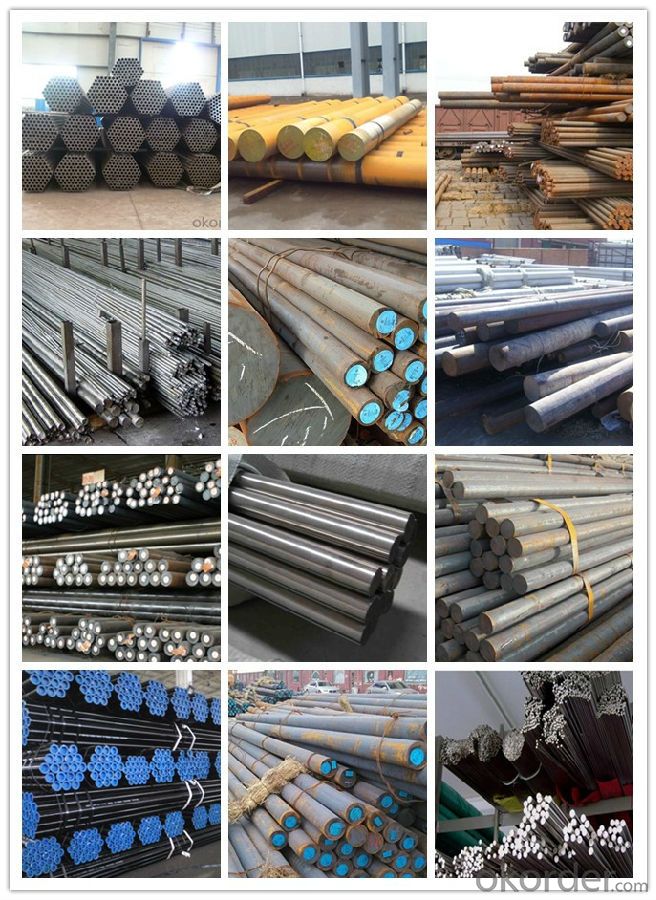
Workshop show
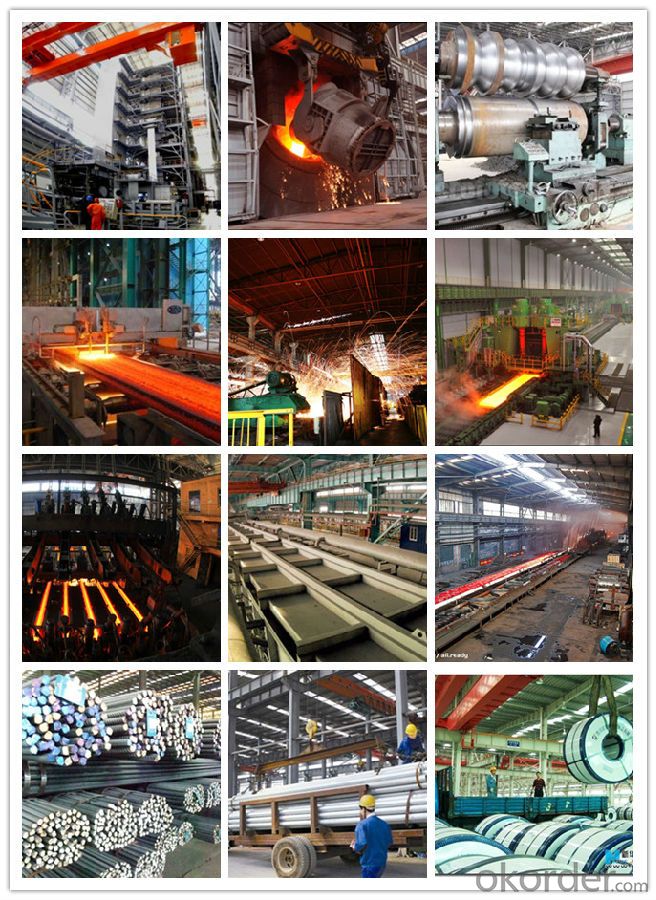
Shipping
1. FedEx/DHL/UPS/TNT for samples, Door-to-Door;
2. By Air or by Sea for batch goods, for FCL; Airport/ Port receiving;
3. Customers specifying freight forwarders or negotiable shipping methods!
Delivery Time: 3-7 days for samples; 5-25 days for batch goods.
Payment Terms
1.Payment: T/T, L/C, Western Union, MoneyGram,PayPal; 30% deposits; 70% balance before delivery.
2.MOQ: 1pcs
3.Warranty : 3 years
4.Package Informations: 1) EXPORT, In 20 feet (GW 25 ton) or 40 feet Container (GW 25 ton)
2)as customer's requirement
Why choose us?
(1) The leading exporter in China special steel industry.
(2) Large stocks for various sizes, fast delivery date.
(3) Good business relationship with China famous factories.
(4) More than 7 years steel exporting experience.
(5) Good after-sales service guarantee.
- Q: How does heat treatment affect the properties of special steel?
- Heat treatment can significantly impact the properties of special steel. By subjecting the steel to controlled heating and cooling processes, its mechanical properties can be modified. For instance, heat treatment can enhance the steel's hardness, strength, and toughness, making it more suitable for specific applications. Additionally, heat treatment can alter the steel's microstructure, such as grain size and distribution, thereby affecting its corrosion resistance and overall performance. Overall, heat treatment plays a crucial role in tailoring the properties of special steel to meet desired requirements.
- Q: How does special steel ensure product traceability?
- Product traceability is guaranteed in special steel through a variety of measures and processes implemented during production and supply chain management. To begin with, detailed records of the production process are maintained by special steel manufacturers. These records encompass information on the raw material source, specific production techniques utilized, and the testing and inspection procedures carried out at each stage. By possessing these records, a comprehensive traceability is achieved as they provide a clear historical account of each product from its inception to its final form. Special steel manufacturers also adopt robust quality control systems that involve assigning unique identification codes or markings to each product. These codes aid in tracking the product throughout its lifecycle, facilitating easy identification and traceability. Furthermore, advanced technology systems such as barcode scanning, radio frequency identification (RFID), or blockchain are often employed by special steel manufacturers to monitor and trace their products. These systems enable real-time monitoring and recording of product movements, thereby ensuring accurate traceability and transparency. Additionally, special steel manufacturers maintain strong relationships with their suppliers and customers, establishing a transparent and traceable supply chain. They collaborate closely with suppliers to validate the origin and quality of raw materials, while also working closely with customers to provide them with detailed information regarding the product's manufacturing process and its journey through the supply chain. In conclusion, special steel manufacturers prioritize product traceability by implementing stringent record-keeping systems, advanced technology solutions, and maintaining transparent relationships with suppliers and customers. These measures not only guarantee the quality and reliability of special steel products, but also provide customers with assurance regarding the origin and authenticity of the product.
- Q: Can special steel be used for making aerospace engine components?
- Certainly, aerospace engine components can be made using special steel. The aerospace industry commonly utilizes special steel alloys, such as nickel-based superalloys and stainless steels, due to their remarkable mechanical properties, ability to withstand high temperatures, and superior resistance to corrosion. These alloys are specifically engineered to endure the extreme conditions and demands of aerospace engines, including high temperatures, pressures, and stress levels. Moreover, special steel alloys offer a high strength-to-weight ratio, which is crucial in reducing the weight of aerospace components while preserving their structural integrity. Consequently, the utilization of special steel in aerospace engine components ensures the dependability, performance, and safety of engines in aeronautical applications.
- Q: Can special steel be used in the glass manufacturing industry?
- Yes, special steel can be used in the glass manufacturing industry. It is commonly used for the construction of glass melting furnaces, molds, and other equipment that require high heat resistance and mechanical strength.
- Q: How does special steel contribute to the oil and gas industry?
- Special steel plays a crucial role in the oil and gas industry by providing strength, corrosion resistance, and durability to equipment and infrastructure. It is used in the construction of pipelines, drill pipes, wellheads, valves, and various other components. The unique properties of special steel enable it to withstand harsh operating conditions, high pressures, and corrosive environments, ensuring the reliability and safety of oil and gas operations.
- Q: Can special steel be used in automotive engine components?
- Yes, special steel can be used in automotive engine components. Special steel, such as high-strength, heat-resistant, or corrosion-resistant alloys, is often selected for critical engine parts like crankshafts, connecting rods, valves, and camshafts to enhance performance, durability, and efficiency.
- Q: How does special steel contribute to the manufacturing of precision components?
- The manufacturing of precision components heavily relies on special steel, which offers a wide range of desirable properties necessary for achieving high levels of accuracy and reliability. To begin with, special steel is renowned for its remarkable strength and durability. This enables precision components to endure the immense stress and load they may encounter during operation. By utilizing special steel, manufacturers can create precision components that can withstand intense forces without warping, deforming, or breaking, ensuring long-lasting performance and reliability. Furthermore, special steel demonstrates excellent resistance to wear. Components manufactured from special steel can endure friction, abrasion, and wear caused by continuous use or contact with other materials. This is especially crucial for precision components, as even the slightest wear or deformation can significantly impact their functionality and accuracy. By employing special steel, manufacturers can guarantee that precision components maintain their shape and integrity, resulting in superior performance and longevity. Moreover, special steel offers outstanding machinability. Its composition and properties make it easier to cut, shape, and form into complex geometries, allowing manufacturers to produce intricate precision components with tight tolerances. This improved machinability facilitates the production of components with precise dimensions, ensuring accuracy and consistency in the final product. Additionally, special steel exhibits excellent resistance to corrosion. Precision components are frequently exposed to harsh environments, chemicals, or moisture, which can lead to corrosion and degradation. However, special steel's corrosion resistance properties help prevent rusting and corrosion, ensuring that precision components remain functional and reliable throughout their lifespan. Lastly, special steel provides thermal stability and resistance to high temperatures. Precision components may come into contact with extreme heat or experience rapid temperature changes during operation. The ability of special steel to withstand these conditions without compromising its strength or dimensional stability is crucial in ensuring the performance and accuracy of precision components in demanding applications. In conclusion, special steel plays a vital role in the manufacturing of precision components by offering exceptional strength, wear resistance, machinability, corrosion resistance, and thermal stability. These properties enable manufacturers to produce precise, high-quality components that meet the stringent requirements of various industries, including aerospace, automotive, electronics, and medical devices.
- Q: Can special steel be coated?
- Yes, special steel can be coated. Coating special steel provides several benefits such as corrosion resistance, improved aesthetics, increased durability, and enhanced functionality. There are various coating materials and techniques available for special steel, including but not limited to electroplating, hot-dip galvanizing, powder coating, and ceramic coating. These coatings help protect the steel from environmental factors, chemical exposure, and wear and tear, thereby extending its lifespan and maintaining its performance. Additionally, coatings can also be customized to provide specific properties like non-stick surfaces, heat resistance, or anti-microbial properties, depending on the intended application of the special steel.
- Q: How does special steel contribute to the manufacturing of defense equipment?
- The unique properties and characteristics of special steel play a vital role in the production of defense equipment. To begin with, special steel is renowned for its exceptional strength and durability, making it perfect for constructing various defense equipment components. This high strength enables the creation of lightweight yet sturdy structures, allowing for the development of advanced weaponry and protective gear. Additionally, special steel possesses remarkable resistance to corrosion and wear, making it highly suitable for defense equipment operating in harsh environments. Its resistance to corrosion ensures that the equipment remains functional and dependable even in extreme conditions, including exposure to saltwater or acidic environments. Moreover, special steel offers outstanding heat resistance, a crucial feature for defense equipment like missile casings or jet engine components. Its ability to withstand high temperatures without compromising its integrity or mechanical properties enables the production of more efficient and powerful defense systems. Furthermore, special steel can be customized to meet specific requirements, facilitating the manufacturing of personalized defense equipment. It can be alloyed with various elements to enhance specific characteristics, such as increased hardness, improved magnetic properties, or better impact resistance. This adaptability allows for the production of defense equipment tailored to the precise needs of military applications, enhancing overall performance. In conclusion, special steel significantly contributes to the manufacturing of defense equipment through its exceptional strength, resistance to corrosion and wear, heat resistance, and customization options. These properties enable the creation of more advanced, reliable, and efficient defense systems that meet the demanding requirements of modern military operations.
- Q: What are the specific requirements for special steel used in the power transmission industry?
- The specific requirements for special steel used in the power transmission industry include high strength and durability to withstand heavy loads and vibrations, excellent corrosion resistance to withstand harsh environmental conditions, good electrical conductivity for efficient power transmission, and precise dimensional accuracy to ensure proper fit and alignment in power transmission components. Additionally, special steel used in this industry needs to have excellent fatigue resistance to withstand cyclic loading and prolonged stress, as well as good thermal stability to handle high temperatures generated during power transmission.
Send your message to us
Special Steel DIN 1.2365 Steel Round Bar
- Loading Port:
- China main port
- Payment Terms:
- TT OR LC
- Min Order Qty:
- 30 m.t.
- Supply Capability:
- 10000 m.t./month
OKorder Service Pledge
OKorder Financial Service
Similar products
Hot products
Hot Searches
Related keywords
